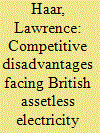| Srl | Item |
| 1 |
ID:
180122


|
|
|
|
|
| Summary/Abstract |
From the outset of deregulation and privatisation of UK electricity markets, the desired extent of vertical integration has been debated. Concerns over the dominance of the “Big Six” majors and whether consumers were receiving a fair deal, led the new Government of 2010 to promote the entry of new retail supply firms without generation assets. Increasing consumer choice and facilitating supplier switching were seen as counter-weights to the dominance of the vertically integrated majors. Through various policies favouring new, assetless suppliers, the domestic retail electricity market in the UK has become less concentrated offering more choice to consumers. But the process of reducing market concentration has had setbacks: many new retail suppliers went bankrupt and service quality has been mixed. To address possible short-comings, the Regulator in mid-2019 introduced stricter requirements for a retail supply license but are they sufficient? Combining theory with empirical analysis, it is argued that enhanced requirements are unlikely to be sufficient to ensure the success of these new firms because assetless retailers face competitive disadvantages under the current market structure. Before debating the role and benefits of such firms, their economic viability should be assessed.
|
|
|
|
|
|
|
|
|
|
|
|
|
|
|
|
| 2 |
ID:
177488


|
|
|
|
|
| Summary/Abstract |
In liberalised energy markets, electricity from Renewable Energy (RE) using Solar PV and Wind Turbines requires financial support because the expected number of generation hours is insufficient to induce private investment. Such support has a direct cost from the additional expenditure over what would have been incurred had fossil fuel generation been used and indirect costs arising from the random and distributed nature of the RE output. Comparing European Union countries between 2007 and 2017, we find the pricing structure of retail electricity is regressive and correlated to reliance upon RE. Although initially, the direct and indirect costs of RE affects integrated utilities and aggregators, the ultimate burden largely falls upon lower income cohorts. Given policy objectives for RE, these finding are worrisome. Though as a society we may benefit from reducing dependence upon fossil fuels, the burden of this transition falls upon those with the lowest income, raising questions over fairness. Explaining the reasons for fiscal regressiveness leads to suggestions on how it may be redressed.
|
|
|
|
|
|
|
|
|
|
|
|
|
|
|
|